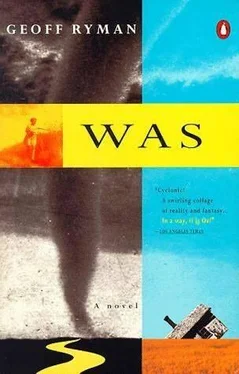In the far corner there were double doorways that seemed to promise a more substantial restaurant. CARLOS O'KELLY'S MEXICAN CAFE, said a sign. Jonathan seemed to waft into it. Suddenly he was standing before an empty front desk. No one came to help him. He felt foolish. He walked past a kind of structural screen of plaster, meant to suggest a Mexican building.
The place was a confusing welter of decor-stuffed foxes, Pepsi signs, cow horns, old tin advertisements of women who raised fringed skirts like theater curtains over their thighs, antique (perhaps) mirrors. A table full of male students as big as sides of beef roared with laughter. Jonathan jumped as if they were laughing at him. A waiter finally came up, apologizing. "Sorry, it's kinda late, I'm the only one here," he said. For some reason he had a flapper haircut, like a woman from the 1920S. He wore very baggy shorts almost to the knee. He sat Jonathan at a table and passed him a large menu encased in plastic sheeting.
Chimichangas, thought Jonathan. They had not existed a decade before. In the 1970S, you sat down to beans, enchiladas and chile rellenos. Who invented chimichangas? Were they authentic? If not, how long did it take for something to become authentic?
Time seemed to be leapfrogging over itself. Parts of it were missing. The sides of beef had been laughing so long and so hard they couldn't stop and one of them was in danger of choking. He made squeaking noises like a mouse. Jonathan felt distant from them, and sour. How did they get so big, so strong? He didn't want to eat. The waiter came, bringing him a microwaved chimichanga. When had he ordered that?
Jonathan was used to being friendly and tried to talk to the waiter. Was he a KSU student? How did he find time to do this and his homework? Jonathan was losing his conversational touch-university studies are not called homework. Jonathan felt like one of those plastic fairgrounds smiles had been stuck on his face. It was held in place by biting down.
What was he studying? The answer flattened the conversation like some pathetic animal run down on the freeway. The young man was studying the marketing of new textiles. Uh. Did that mean he researched what kinds of new fabrics people wanted?
Not exactly. It was more to do with pricing strategies. "Only people are beginning to tell me the market is bottoming out and I don't know if I'll stay in it." He had a pleasant, intelligent face, a hooked nose. He was enthusiastic when he found out Jonathan was from L.A.
"Oh, I love Los Angeles!"
"I love Manhattan," said Jonathan.
"How come?" the young man was mystified.
"Its history."
"Manhattan has a history?" The young face was crooked.
"Got more history than Los Angeles. Los Angeles, they just bury it under the freeway."
"Oh but the shopping is wonderful!"
Jonathan looked at his pleasant, intelligent face and said, "Your values suck."
Had he really said that? The young man was no longer there. A cold chimichanga was half-eaten on his plate, and Jonathan's throat and gut felt like a wall from which paint was peeling. He coughed slightly, and something really did seem to come free. He swallowed it. The stuffed fox, the orange lights, the drifting beer signs swam inside his eyes.
Jonathan got up to go. He forgot to pay.
Outside, there were humps in the parking lot, like that designer supermarket where there were buried cars for a joke. Knees jiggling uncertainly, as if he were trying to be hip, Jonathan walked forward.
Which car?
He found he couldn't remember the make or the model or the color. He was color-blind, and in this light, they would all look the same. He walked down a row, looking at license plates. He wouldn't be able to tell.
He panicked again. How am I going to get back? he wondered miserably. How will I ever find the car again, how will I get it back to Hertz? Jesus, I can't even go to a restaurant and park a car anymore. It was dark and traffic whined past on the big blue road around Manhattan where the river had been. Trucks, the odd car, wind, emptiness.
What am I going to do? he wondered.
Then he saw the sign, glittering on down the road. BEST WESTERN. Maybe a mile away. He began to walk.
There were ditches and treacherous green humps of manicured grass. Jonathan kept stumbling. He made a sound over and over, like he was about to sneeze. He was dimly aware of it. It was just how he breathed these days. When he was in trouble.
There were train tracks underfoot, hard metal, and splintering ties, and he kept stumbling. Why were there humps and train tracks? Would he get flattened by a train, or would he hear it first? And where was the other river, why was there only one river now?
A child's voice whispered to him: "There was a flood and the river moved."
Very suddenly, everything spun up and under and away from him. Jonathan lost his balance and fell onto the train track and felt the earth spin and his dinner pour back out of him. It hurt, as if he were vomiting up raw sand.
"I can't keep down my food," he said, feeling weak and a little bit tearful. His own body was something precious that had been lost.
It was the beer, he shouldn't have drunk that beer with the chimichanga. Remember, he told himself, no more alcohol anymore. Say goodbye to beer. He managed to reel up to his feet and stagger on along the train track. The train track ended suddenly, no longer wanted. Jonathan veered right and slipped down into a dry, lawn-mowed ditch. Huge trucks buffeted past him, coughing over him. To his left were a Wendy's, a Pizza Hut, alone, isolated and empty, the lights still on.
Ahead was the office of the Best Western, and he could see through its glass walls that it was lit, with a television on. He felt calmer.
Inside, the office smelled like some particularly fruity flavor of bubble gum. Jonathan wiped his face on his sleeve. Angel came out of the back office.
"I'm sorry," said Jonathan. "I can't remember my room number."
He thought he managed to say it very well, with just the slightest catch of tension in his voice.
"Dontcha have the key?" Angel asked, pulling her pallid hair back from her face.
"I forgot it," he said. He made a joke of it. "But I can just about remember my name still, so if I tell you that, will you tell me the room?"
"I'll have to open up for you as well," she said, looking over her list. She glanced up. "Are you all right?" she asked.
What could he tell her? Yeah, I feel great? He felt like mist about to be blown away. "I'm not too well," he admitted.
She waved toward herself. "Lean forward," she told him and felt his forehead. "You got a fever. You want me to drive you to the hospital?"
"No!" he said, too abruptly. He modulated. "No, no thanks, I just want to sleep."
"All righty. Let's get you all tucked in." The keys clinked pleasantly.
As soon as they stood outside the door, Jonathan remembered the room number: 225. The lights were still blazing. Angel opened the door, and everything was just as he had left it: sealed. The room smelled like a headache.
"There's some aspirin in the medicine chest," she said. "If you need anything, just press nine." She pointed to the telephone.
Jonathan couldn't make sense of the words, so he nodded and smiled. Oh, yeah, I'll be fine, he thought he had said. She nodded and closed the door and Jonathan went into the bathroom and retched blood. The droplets spread on the surface of the water of the toilet bowl like stars spinning away from galaxies. Jonathan drank some water from the cold tap of the basin and that promptly bounced back out like sheet rubber.
I can't keep down water, he thought. His stomach burned. The tips of his fingers buzzed. Shivering, he peeled off his clothes. There were patches of sweat on them. The stale, warm air made his tender skin rise up in goosebumps. The sheets felt freezing and he curled up on them, his bones quaking in spasmodic jolts.
Читать дальше












